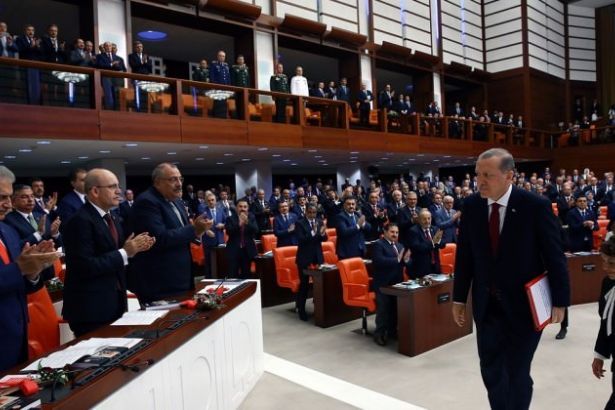Turkish parliament decides to 'repeal' itself: Erdoğan cabinet gets legislative power

A law proposing that the cabinet shall have the authority to pass legislative decrees even after the general and presidential elections on June 24 was passed on May 10. This is rather odd, since it bears several contradictions and some danger.
With a law that was passed in January 2017 and put out for (and accepted, though questionable, after) the presidential referendum in April 2017, the prime ministry was evened up to null, the authority of the ministries was gathered in the hands of the president, and the adjustment laws were said to be passed in 6 months. However, in the past 1.5 years, no adjustment law was brought to the parliament, despite the fact that there are now only weeks until the elections.
Prime Minister Binali Yıldırım claimed that they had not had the time to bring out the adjustment laws among all the other things that kept them busy and that they would have to sort things out by legislative decrees – but the government did have the time to pass dozens of legislation that allowed employment agencies to find people temporary jobs, that directed employees to obligatory negotiators instead of law courts, that enabled the capitalists to make hundreds of billions of profit through practices such as investment incentives, cash repatriation, tax and zoning amnesty.
The law that allows the cabinet to pass the adjustment laws in the form of legislative decrees was discussed, written, and passed in only 3 days. Even though it was the constitutional committee that was responsible for the draft, the law was discussed only by the Committee on Planning and Budget.
Moreover, although the government states that they did not have enough time, the amount of details given by the Deputy Prime Minister Bekir Bozdağ shows that the legislative decrees have already been prepared: "…there are 879 constitutive laws in effect. 521 laws and 40 legislative decrees will be changed. 2843 articles will be removed, 2470 articles will be changed."
The law also suggests that the cabinet can pass legislative decrees until the next president takes the oath, which will be in approximately 25 days after the elections. However, the parliament could be renewed, the cabinet could be changed, and the new president could be elected on June 24 – yet, the current cabinet can still pass legislative decrees until the new president’s oath.
In addition to this controversy, one problem is that the current President Recep Tayyip Erdoğan might not approve of the new parliament’s composition, and he might demand the renewal of elections, which might result in months of rule by legislative decrees in the best case scenario.
If Erdoğan cabinet's authority to pass legislative decrees is preserved until after the elections, this may cause another problem: The legislative decrees might be rewritten depending on the numbers in the Parliament after the elections, and whether the next Erdoğan or not.
Another problem is that, according to the current constitution, a legislative decree must be presented to the speakership of the parliament – but the current parliament is going to recess on May 17, and the next one has not come into office yet.
Some other statements of Bekir Bozdağ indicated that not only by the cabinet, but also the legislative decrees to be put forth by the president are ready: "When the president has taken the oath … the current system will have changed completely … The new president will, of course, have their plans. Continuity is essential in the state. So, what we have done? We have prepared the whole infrastructure for the President … In the moment the president takes the oath, the presidency will pass the legislative decrees, and the system will continue to operate smoothly, without any setbacks in the operations of the state.”
The current constitution requires that in order for the cabinet to have the authority to pass legislative decrees, the extent, basic principles and conditions, the framework, and the duration of the law must be defined clearly. Yet, nothing of the above is characterised about the authority now given to the cabinet.
Finally, on May 10, the Head of the Committee on Planning and Budget told the members of the committee that another draft was on its way.




